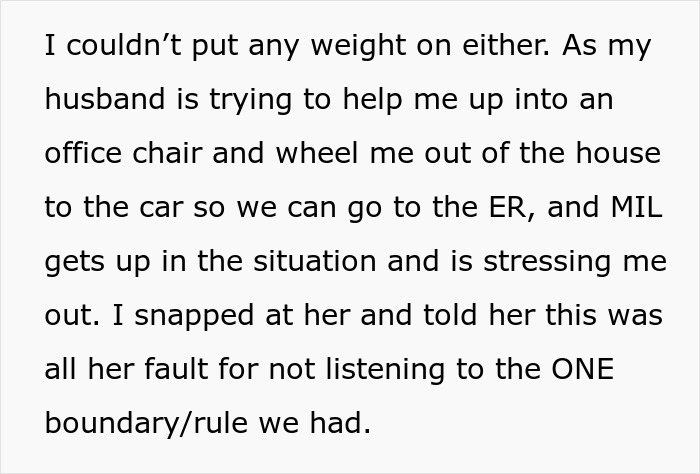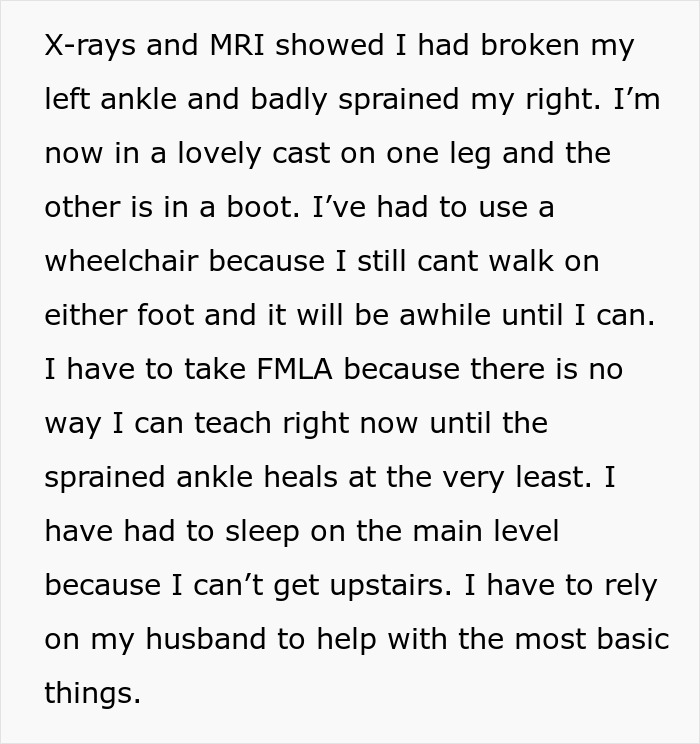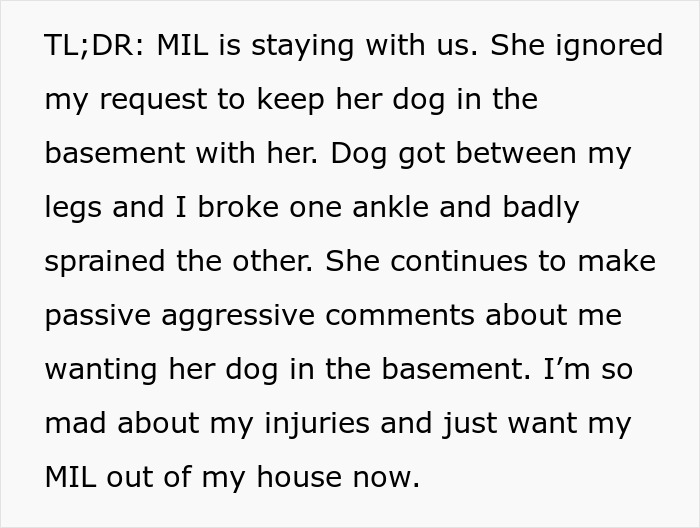When you’re a guest in someone else’s home, the best thing you can do is be respectful. Empty the dishwasher before your hosts get home from work, tidy up the bathroom when they’ve had a busy week, and don’t do anything to make their lives harder.
But when one woman ended up with a broken ankle thanks to her mother-in-law’s dog, she decided that she had had enough of hosting the pair. Below, you’ll find the full story that this frustrated woman recently posted on the Just No MIL subreddit, as well as a conversation with Relationship Therapist and Life Coach Nia Williams of Miss Date Doctor!
This woman’s mother-in-law has been staying with her since she separated from her husband

Image source: cottonbro studio / pexels (not the actual photo)
But when the mom’s failure to follow their house rules resulted in serious injuries, the woman decided that she wants her mother-in-law out







Image credits: GeorgeRudy / envato (not the actual photo)



Image source: serena-94
“Having in-laws or parents stay can often cause tension, as it disrupts the usual household dynamics”

Image credits: RDNE Stock project/ pexels (not the actual photo)
Having issues with the in-laws may sound like a cliché, but there’s a reason why this has become such a common trope. Unfortunately, the BBC reports that a whopping 75% of couples admit they’ve had issues with an in-law. But apparently, women are much more likely to struggle with their partner’s parents than men.
In fact, a survey from Fatherly found that women are 16% more likely to experience a sense of dread before seeing their partner’s parents than men. And as far as how spouses would rate their relationships with their in-laws, men reported much higher ratings than their female partners.
So what kinds of conflicts are people having with their in-laws? Fatherly reports that nearly a third of parents argue with their in-laws about parenting styles, and 15% have tense disagreements about politics. 14% also have conflicts involving money, and 4% admitted that their in-laws pressure them to have a more successful career.
To find out more about this situation, we reached out to Relationship Therapist and Life Coach Nia Williams from Miss Date Doctor, who was kind enough to share her thoughts with Bored Panda. First, we wanted to know what couples should discuss before deciding to move one of their parents in with them.
“Couples should have an open conversation to set clear boundaries and expectations. Topics to discuss include house rules, financial contributions, length of stay, and how responsibilities will be shared,” Nia says. “Both partners need to agree on their priorities to avoid misunderstandings.”
“Having in-laws or parents stay can often cause tension, as it disrupts the usual household dynamics,” the therapist says. “Different living habits, unspoken expectations, or boundary issues can add pressure, so clear communication and agreed boundaries are essential to reduce potential conflicts.”
“Open communication, empathy, and respect for each other’s needs go a long way in managing such challenges”

Image credits: Jep Gambardella / pexels (not the actual photo)
So what should we do if conflicts arise while an in-law is staying over? “If an in-law is causing issues, it’s important for the spouse to approach the topic with compassion and honesty,” Nia shared. “A calm, non-confrontational discussion that focuses on the specific issues (such as boundaries not being respected) can help address the situation without escalating tensions.”
“It is fair to ask an in-law to stay elsewhere if the situation is negatively affecting the well-being of the household. However, it’s best to approach the matter delicately, offering alternatives or compromises to minimize feelings of rejection,” the therapist added.
We also asked Nia about difficult situations like this, where one person is inevitably going to upset their spouse or their parent. “When caught between a parent and a partner, it’s essential to prioritize the marriage, as maintaining a strong partnership is key to a healthy home environment,” she says.
“This doesn’t mean disregarding the parent’s feelings, but rather focusing on resolving the situation in a way that maintains respect for both parties. The spouse should aim to be a mediator, but ultimately, the health and harmony of the immediate family take precedence over external relationships,” Nia explained.
Finally, the expert says it’s important to remember that boundaries aren’t just about control. “They are about creating a healthy, comfortable space for everyone. Ensuring these boundaries are respected is vital for family harmony,” Nia told Bored Panda.
“When they are crossed, it’s okay to feel upset and seek resolutions, even if those conversations are difficult. Open communication, empathy, and respect for each other’s needs go a long way in managing such challenges.”
We would love to hear your thoughts on this situation in the comments below, pandas. Then, if you’re interested in checking out another Bored Panda piece discussing in-law drama, we recommend reading this article next!
Later, the woman shared an update on where she’s staying now


Readers were horrified by the story, and many agreed that the mother-in-law has overstayed her welcome

























